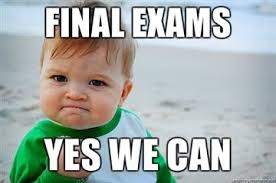A Sneak Peek: Science Olympiad
Competitor Interviews
By Sheryl Lin
Welcome back to our sneak peeks! Here are a few interviews of some of our Science Olympians themselves. See our other interview with Mr. Wagner as well, to see if you’re interested in joining!
Victoria Pietrusiewicz (7th grade) - 1st place winner in Anatomy and Physiology, Air Trajectory
What event did you just finish? - “Air Trajectory!”
How was Air Trajectory? What did you have to do? - “Make a ball… fly.”
What was the building like? - “Coooooooool.”
Was it fun? - *nods*
Victoria seemed a bit tired since it was about 8 in the morning on a Saturday, so I moved on to bother someone else.
Keith Macias (7th grade) and Lauren Jablonowski (7th grade) - 5th place in Microbe Mission, 7th place in Disease Detective
What event did you just finish? - Lauren: “We just finished Microbe Mission, and we did very well, and we guessed on one. We were going to erase it, but it was actually right.”
Keith: “It was the gas that yeast produces, and I guessed methane, and then I said carbon dioxide as a joke, and guess what?”
Lauren: “It- it was carbon dioxide.”
So, how was it? - Keith: “It was pretty awesome, we knew everything!
Lauren: “Yeah, I knew some that Keith didn’t know, and I call that an accomplishment! Keith knew half of it though.”
What was the information you had to study about? - Keith: “It was about microbiology, some microorganisms, microscopy, yeah. A lot of stuff!”
Lauren: “I’m gonna go get some pizza, peace.” (we actually bought out all the pizza before any of the other schools that day, it was great)
Was it fun? - Keith: “Of course it was!”
Dylan Santiago (8th grade) - 5th place in Optics
What event did you do? - “I have two events at the end of the day; I did not go. All of my events are at the end of the day.”
I nodded and, seeing that Dylan was likely about to do some preparation for his upcoming events, I left.
Marcus Llorente (8th grade) and John Bellisio (8th grade) - 4th place in Astronomy
What event did you just finish? Was it fun? - John: “Reach for the Stars, Astronomy, yeah.”
Marcus: “It was stressful.”
John: “Are you gonna post this onto Youtube or something?” (I was recording video on my phone.)
Nah, it’s for our newspaper.
John: “Oh. Well, we did good in Reach for the Stars, so hopefully we get a medal.”
What were the questions like? - Marcus: “Well, they were locating objects, locating constellations, stars, things like that.”
John: “Yeah, it was deep sky objects.”
Ryan: “And shallow space objects?”
John: “I think we’re gonna win a medal.”
Ryan Talbot (8th grade) - Meteorology, Experimental Design, Bridge Building and Bio Process Lab
What event did you just finish? - “Bio process lab!”
Was it fun? - “No!”
What was the test about? - “Bio process lab! General science, food chains, acidity, weather! Nutrition!”
Food science?
“No, not exactly food science.”
Suddenly the room had burst into chaos, something involving a balloon, popping, and a lot of screaming. I moved onto the next closest person.
Alyssa Kemp (7th grade) - Bio Process Lab, Experimental Design
What event did you just finish? - “Bio process lab.”
What were the questions like?
Alyssa was covering her face, both in fear of my camera and the continuing screaming in the room.
Johnny Martinez (7th grade) - 10th place in Wind Power, Crime Busters
Hi Liam, what event did you just finish? - “I’m not Liam, I’m Johnny, I thought you’d know that!”
Oh, sorry, Johnny, what event did you just finish? - “Crime Busters.”
Was it fun? - “No, it was hard.”
What kinds of questions were they? - “Hard questions, like, powders, reactions to iodine, and acidic acid… I’m done here.” *walks away*
Wait, did you have to take a test or did you do lab things? - “It was like a test.”
Oh. Dang. - “Well, no, it was kinda like a lab. Kinda like a lab, kinda like a lab!”
Looks fun to you? Are you a 7th or 8th grader that’s enthusiastic about science? Come along and join us!





